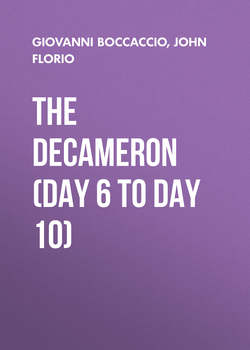Читать книгу The Decameron (Day 6 to Day 10) - Джованни Боккаччо, Giovanni Boccaccio - Страница 4
THE SIXT DAY
The First Novell
ОглавлениеReprehending the folly of such men, as undertake to report discourses, which are beyond their wit and capacity, and gaine nothing but blame for their labour
Gracious Ladies, like as in our faire, cleere, and serene seasons, the Starres are bright ornaments to the heavens, and the flowry fields (so long as the spring time lasteth) weare their goodliest Liveries, the Trees likewise bragging in their best adornings: Even so at friendly meetings, short, sweet, and sententious words, are the beauty & ornament of any discourse, savouring of wit and sound judgement, worthily deserving to be commended. And so much the rather, because in few and witty words, aptly suting with the time and occasion, more is delivered then was expected, or sooner answered, then rashly apprehended: which, as they become men verie highly, yet do they shew more singular in women.
True it is, what the occasion may be, I know not, either by the badnesse of our wittes, or the especiall enmitie betweene our complexions and the celestiall bodies: there are scarsely any, or very few Women to be found among us, that well knowes how to deliver a word, when it should and ought to be spoken; or, if a question bee mooved, understands to suite it with an apt answere, such as conveniently is required, which is no meane disgrace to us women. But in regard, that Madame Pampinea hath already spoken sufficiently of this matter, I meane not to presse it any further: but at this time it shall satisfie mee, to let you know, how wittily a Ladie made due observation of opportunitie, in answering of a Knight, whose talke seemed tedious and offensive to her.
No doubt there are some among you, who either do know, or (at the least) have heard, that it is no long time since, when there dwelt a Gentlewoman in our Citie, of excellent grace and good discourse, with all other rich endowments of Nature remaining in her, as pitty it were to conceale her name: and therefore let me tell ye, that shee was called Madame Oretta, the Wife to Signior Geri Spina. She being upon some occasion (as now we are) in the Countrey, and passing from place to place (by way of neighbourly invitations) to visite her loving Friends and Acquaintance, accompanied with divers Knights and Gentlewomen, who on the day before had dined and supt at her house, as now (belike) the selfe-same courtesie was intended to her: walking along with her company upon the way; and the place for her welcome beeing further off then she expected: a Knight chanced to overtake this faire troop, who well knowing Madam Oretta, using a kinde and courteous salutation, spake thus unto her.
Madam, this foot travell may bee offensive to you, and were you so well pleased as my selfe, I would ease your journey behinde mee on my Gelding, even so farre as you shall command me: and beside, wil shorten your wearinesse with a Tale worth the hearing. Courteous Sir (replyed the Lady) I embrace your kinde offer with such acceptation, that I pray you to performe it; for therein you shall doe me an especiall favour. The Knight, whose Sword (perhappes) was as unsuteable to his side, as his wit out of fashion for any readie discourse, having the Lady mounted behinde him: rode on with a gentle pace, and (according to his promise) began to tell a Tale, which indeede (of it selfe) deserved attention, because it was a knowne and commendable History, but yet delivered so abruptly, with idle repetitions of some particulars three or foure severall times, mistaking one thing for another, and wandering erroneously from the essentiall subject, seeming neere an end, and then beginning againe: that a poore Tale could not possibly be more mangled, or worse tortured in telling, then this was; for the persons therein concerned, were so abusively nicke-named, their actions and speeches so monstrously misshapen, that nothing could appeare to be more ugly.
Madame Oretta, being a Lady of unequalled ingenuitie, admirable in judgement, and most delicate in her speech, was afflicted in soule, beyond all measure; overcome with many colde sweates, and passionate heart-aking qualmes, to see a Foole thus in a Pinne-fold, and unable to get out, albeit the doore stood wide open to him, whereby shee became so sicke; that, converting her distaste to a kinde of pleasing acceptation, merrily thus she spake. Beleeve me Sir, your horse trots so hard, & travels so uneasily; that I entreate you to let me walke on foot againe.
The Knight, being (perchance) a better understander, then a Discourser; perceived by this witty taunt, that his Bowle had run a contrarie bias, and he as farre out of Tune, as he was from the Towne. So, lingering the time, untill her company was neerer arrived: hee lefte her with them, and rode on as his Wisedome could best direct him.
Cistio a Baker, by a wittie answer which he gave unto Messer Geri Spina, caused him to acknowledge a very indiscreete motion, which he had made to the said Cistio
